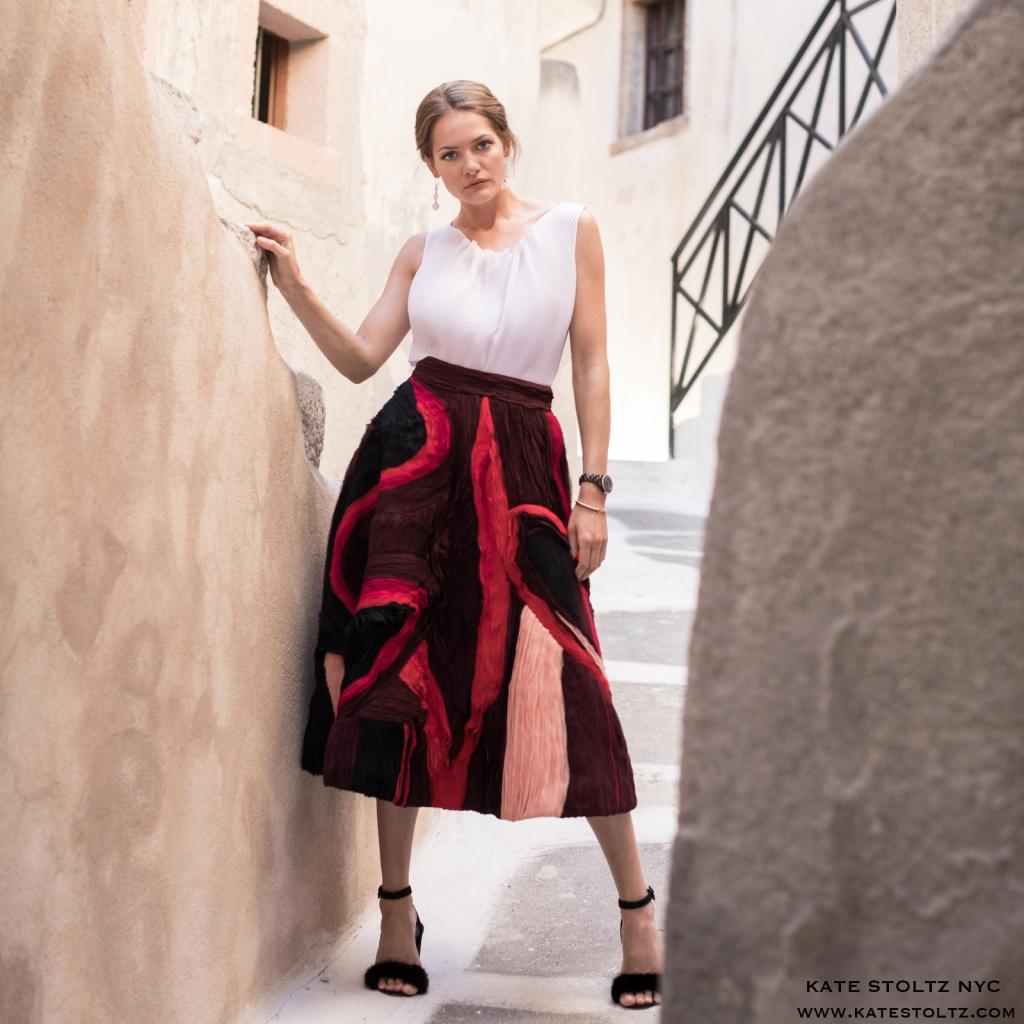
By Marilyn Graves
With the current pandemic bringing the world as we knew it to a screeching halt, the fashion industry is just one area being hit hard. With stores closing, workers staying home, and fashion houses closing their doors, the entire fashion culture has changed in a matter of months. We asked three designers how their companies are being affected by the Coronavirus and what they are doing in response, from ramping up their ecommerce operations to pivoting to making masks for first responders. Here’s what they said:
Kate Stoltz defines her self-titled brand as a “made to measure womenswear brand that specializes in garments crafted out of luxury textiles for a refined woman that appreciates craftsmanship and a custom fit.” The main goal for this socially aware brand is to become more eco-friendly this year–using more sustainable fabrics and doing away with plastic in their packaging.
With needs changing due to the Coronavirus, the brand has pivoted and has begun to make face masks. By offering a ‘free mask plus shipping’ option for first responders and those in need, they have been able to help keep people safe (and stylish) with their new mask collection. With so many orders to produce, workers are producing masks around the clock, but proceeds from the masks are all going toward supporting a fair wage for Kate Stoltz seamstresses, supplies, and shipping for masks donated to healthcare providers, essential workers and people in financial need.
The pandemic has not been without challenges for Kate Stoltz, however, as production and shipping times have slowed for the company. With fabric suppliers closing and seamstresses practicing social distancing while working from their homes, it has been impossible to maintain normal operations. Stoltz’s advice for other small businesses: Improve your business where you can and know that “persevering through this time will make you smarter, stronger and more savvy,” she says. “Know that it’s okay to realize a business isn’t working or needs to be paused for a couple months. You can always relaunch.”
Stoltz says there are two major roles designers have to play during this time:
“The first most important role is we should be using our resources to provide masks to people on the front lines in addition to individuals that are at high risk but unable to afford a mask. The second role is: if designers make masks desirable and fashionable so that people will actually want to wear a mask it will increase the number of people that wear them. If everyone is wearing a mask, we can all be more safe.”
iCE GARDEN is a New York/South Korean fusion womens brand based out of Seoul, South Korea that creates clothing and handbags based on designer Sophie Sohee Chung’s personal stories and emotions. The most dramatic changes in operations have been their online store’s presence and increase in digital customers, while plans for participating in shows and exhibitions this spring have been cancelled. The current opportunity for fashion brands to increase their online presence has been beneficial for the company as online showrooms offer them space on their sites and digital magazines feature their pieces. But, ramping up only operations in a short period of time, has proven challenging for many brands as has fulfilling orders in a timely fashion.
Chung expects big changes to the fashion world once the pandemic is over:
“Most things will change digitally, like a fashion show, and showroom business. Department stores will have a hard time surviving in the fashion jungle. Therefore, it’s a good time to learn digital programs such as 3D CLO, and graphics… Recently, I was impressed by Angel Chen’s digital fashion show because there was no limit to creating your world.”
In order to keep sane during Covid, Chung has been reading “Tiny Beautiful Things: Advice on Love and Life from Dear Sugar.” She says the author’s advice is like mental therapy for when you’re feeling down. In order to lift the spirits of customers, she sometimes puts handwritten notes in customer orders that show she cares. Once the pandemic is over, she is looking forward to returning to New York to reunite with her former classmates at Parsons.
Glamrocks Jewelry is a 70’s inspired jewelry company that designs unique, everyday pieces for those looking for affordable, high quality creations you can’t find in department stores. The brand, which has been featured in publications like Cosmo and Health magazine, is only run by three people: Designer Kristen Molenhouse, her husband, and one employee they alternate days in the studio with for safety.
Their greatest loss has been the shutting down of both her wholesale business and her storefront due to the cancellation of trade shows and in-person sales this spring. Molenhouse says she owes a lot to these kinds of slumps, however, as she originally started the business in 2009 after the economy crashed and she decided to do something out of her norm. Molenhouse says she noticed customers reaching out more than ever before since the Covid outbreak and her online sales have increased, keeping her optimistic.
Glamrocks is using this time to give back by donating 10% of sales to Feeding America from April until June and providing free shipping on all orders. Molenhouse says people are looking for something to make them happy and her company hopes to fill that void. She says she is most looking forward to travelling back to New York City when the pandemic is over so she can get back to business.
More of Our Quarantine Content:
Our Quarantine Skincare Routine
